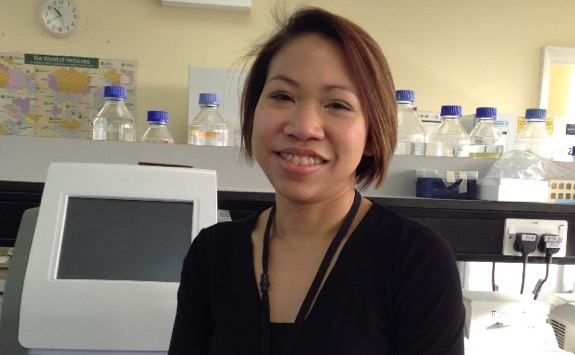Dr Nawaporn Onkokesung
Research Associate.
Nawaporn Onkokesung has come a long way from her Thai roots and first degree in food technology.
After graduating, she went to the Netherlands for her Masters, then on to Germany for her PhD.
She followed this with stints as a post doc back in The Netherlands and in Sweden.
Coming to Newcastle was a very different experience, but one she is enjoying very much.
Thailand-born Dr Nawaporn Onkokesung is enjoying her research into black-grass resistance to herbicides at Newcastle.

Brexit fears allayed by warm welcome
She said: “It was just after the Brexit vote in 2016 that I arrived. I’d only ever been to London when I came to the UK before. That is a much bigger place and very different.
"At the time people were talking about fears of hate crime in the UK. They wondered whether people from abroad would be welcome.
"When I arrived, everyone in Newcastle was so nice and friendly. They would go out of their way to speak to me. It exceeded my expectations."
New direction in research
She had also changed the direction of her research, away from food technology to plants.
She explained: “I was doing my Masters at Wageningen University the Netherlands. During my thesis, I began to realise that the quality of the raw material is key to producing good quality food.
"If you can improve the quality of crop plants, that will reduce costs in processing. It will result in high quality food product.
"Look at the work with rice for example, to improve the iron content and improve people’s diets in Asia.
"So I decided I wanted to go back to the original plants rather than continue to work on food processing. That’s where you can begin to make a real difference.”
From pure science to barley and potatoes
At this stage most of Nawaporn’s research was pure science. She looked at the molecular mechanisms of stress responses in model plants.
With her second post doc, at the Swedish University of Agricultural Sciences, she worked on crop plants. In this case, it was barley and potatoes.
She said: “That was more challenging than working on model plants.
“When you start looking at real crops, you don’t just need to know the theory. You need to think about how that translates into real situations.
"For farmers, resistance of persistent weeds to herbicides is an increasing problem.
"It’s not something that's highlighted generally in crop science, so it’s quite a hidden issue.
"Herbicide resistance in grass weeds will become a huge threat at some point in the future if we don’t address it now.”
Working with Professor Rob Edwards
Nawaporn jumped at the chance to work in Newcastle with Professor Rob Edwards and his team.
She said: “I knew Professor Edwards had looked at herbicide resistance in black-grass for more than 20 years. I felt this fitted my own research interests.”
Black-grass is a common weed that occurs in most of Western Europe. Herbicide resistant black-grass is a major problem. This is especially true in winter cereals such as wheat and barley.
In an infested field, the cereal grain yield is significantly reduced. This has economic consequences for farmers.
Black-grass Resistance Initiative
Nawaporn and colleagues in Newcastle are part of the Black-grass Resistance Initiative (BGRI).
It's funded by the:
- Biotechnology and Biological Sciences Research Council (BBSRC)
- Agriculture and Horticulture Development Board (AHDB)
They carry out a range of research on Black-grass. They're trying to improve our knowledge of how it develops resistance to weedkillers.
The aim is to use this understanding to research better ways of combating the problem. Already there are interesting developments.
Lateral Flow Device
She said: “We have developed a Lateral Flow Device (LFD), using the same technology as a pregnancy test. We can use it in the field to identify black-grass with a high probability to resist herbicides.
"It's based on research in Professor Edwards’ group that discovered a biomarker protein. With the LFDs, it will take approximately 10 minutes to have a test result."
“This is the first generation of the device and we hope to refine it further. The research is to help farmers to be much more targeted in their control regimes.
"This fits well with the objectives of School of Natural and Environmental Sciences. We want to be a research leader in precision agriculture.
School's a 'great platform' for sharing expertise
“I'm fortunate to be able to work with colleagues across so many different disciplines. I hope to move on to a fellowship where I can develop as an independent researcher.
"The School is a great platform for bringing together different areas of expertise. This includes social science. We're addressing real world problems.
"That interdisciplinarity is important. We don’t want to develop technical solutions that are too expensive to use, for example.
“How we are going to feed not only the UK but the world in the future is one of the toughest questions for researchers.
"Precision agriculture and the personalised techniques we are developing will help improve productivity. It will address this major global problem.”
